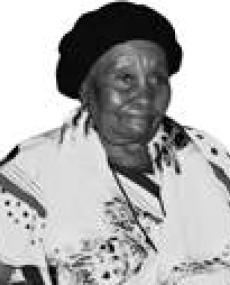
Recorded as one of the most tortured women political prisoners under the apartheid regime, Elizabeth Komikie Gumede was born in 1921.
Gumede served as an operative of the Azanian People’s Liberation Army (APLA), the underground military wing of the Pan Africanist Congress (PAC). Together with two of her now late comrades, John Ganya and Dr Nabboth Ntshuntsha, Gumede ran an underground PAC unit that recruited APLA operatives, sent them to neighbouring countries to receive training, and harboured them when they returned to South Africa for secret missions.
As a consequence of her political activism, Gumede was detained, tortured, and subjected to solitary confinement for years during the 1970s. Moved from one prison to the next, she endured some of the worst forms of torture, assault, and abuse repeatedly. Her involvement in the underground activities of the PAC and APLA was the driving force behind the apartheid police’s determination to wear her down in any way possible, hoping she would eventually succumb to the abuse and reveal crucial information that would enable the security police to remove APLA as a military threat.
The relentless brutalities continued but Gumede refused to break. Her condition eventually became so severe that she would scream from the pain in her prison cell for long periods on end. When her daughter, Busisiwe, passed away during one of her arrests, she was refused permission to go and bury her daughter.
In October 1981, at sixty years old and still kept in solitary confinement, Gumede and four other women prisoners submitted an application against the then- Minister of Justice, Kobie Coetsee, to have their isolation declared illegal. The women reported that they had little exercise, were refused all reading material except for the Bible, and that they were allowed only a few letters or visitors. Typical of the government of that time, their appeal was dismissed and their incarceration – along with the inhumane conditions that came with it – continued unabated.
The police continued with their attempts to force a confession out of Gumede about the whereabouts of wanted APLA members. Incidentally, one of these members was her son as well as Daniel Mofokeng, who went on to serve as Major General in the South African National Defence Force (SANDF). Gumede never wavered.
Forming part of underground political structures in the face of an omnipresent apartheid police force that included the security police, secret service and a network of informers, was the very embodiment of fearlessness by this great fighter whose gender never became an inhibition to her at a time when it took real commitment to become a guerrilla fighter for a liberation movement (The Presidency, n.d.).
As a result of all the torture she was put through, Gumede’s left hand later became paralysed.
In April 2006, she received the South African Government’s National Order of Mendi for Bravery, Bronze category, in recognition of her brave contribution to the struggle against apartheid and how she stood her ground in protecting people like her son and Mofokeng from the clutches of the police.
Elizabeth Komikie Gumede died in 2016. She lived in Chiawelo in Soweto, Gauteng, right until her death. Gumede is remembered for her extraordinary bravery in the face of the inhumane abuse she was subjected to at the hands of the apartheid police. Although they tried to break her will, she remained resolute and did not relent under torture or turn her back on the struggle for an equal, free and democratic South Africa.
Through every near-death experience she endured, she put her life in jeopardy and sacrificed so much to protect her family and comrades in the fight for liberation. Even with everything she faced, she later shared that she had absolutely no regrets.